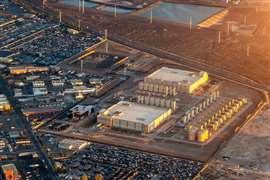Another decrease in Great Britain’s output
19 April 2016
Output in the Great British construction industry in February decreased 0.3% compared to a month earlier, according to the latest report by the Office for National Statistics (ONS).
All new work decreased 0.2%, where there were falls in all types of work, except for private new housing.
Repair and maintenance (R&M) decreased 0.5%, where there were falls in all work types except public housing R&M.
However, compared with the same period a year earlier, output in the construction industry increased 0.3%. All new work was flat, while there was an increase of 0.8% in R&M.
Comparing the three months of December 2015 to February 2016 with the previous 3 months, September 2015 to November 2015, output increased 1.5%. All new work increased 2.5% while there was a fall of 0.3% in R&M.
Meanwhile, comparing the three months of December 2015 to February 2016 to the same period a year earlier, construction output increased 0.3%. All new work increased 0.8% and R&M fell 0.7%.
Peter Vinden, managing director of The Vinden Partnership – a multi-disciplinary consultant company to the built environment – said, “As we saw earlier in the month, the construction industry is still suffering from the economic uncertainty stemming from the European Union referendum in June.
“I don’t expect this to change one way or another until we have our answer on this issue.”
Vinden added, however, that the increase in private housebuilding reported in the figures was encouraging. He said that for months they had talked of the need for the acceleration of housebuilding in the UK and had only recently seen disappointing numbers on that score.
Meanwhile, Michael Thirkettle, CEO of McBains Cooper – an interdisciplinary international construction and property consultancy – said, "Though these figures show growth in the sector, we can see dark clouds on the horizon.
“Investors are telling us that they are being adversely affected by the risk of Brexit (if the UK leaves the EU), increases in stamp duty, in the falls in the oil price and the value of Asian currencies.”
He added that he expected the falls in property prices in London’s most expensive areas to feed through to reduce the number of new developments being built in the capital.
Slowdown in UK construction
The Royal Institution of Chartered Surveyors (RICS) has reported that growth in the private housing sector slowed down considerably during the first quarter of 2016.
Private housing workloads rose at their slowest pace since the second quarter of 2013, with only 36% more of those working in the sector reporting a rise in growth, rather than a fall over the first quarter of 2016. During the same period last year, almost 50% reported a rise.
Looking forward, confidence has dropped as 55% of construction professionals said they expected to see workloads fall over the next 12 month.
RICS chief economist Simon Rubinsohn said that it was a surprise to see a slowdown, given the government’s commitment to the sector, but added that the problem was the availability of land on which new houses can be built.
Risks continue to rise
The Construction Products Association (CPA) has forecast a 3.0% rise in UK construction output during 2016 and 3.6% in 2017 – a downward revision from the 3.6% growth forecast three months ago.
The CPA said that this was a result of heightened concerns regarding the effects of slowdown in global economic growth prospects, the impacts of uncertainty from the upcoming EU referendum, and the potential for growth in the industry given key issues around skills shortages.
It reported that private housing output would rise 5.0% in both 2016 and 2017, new office activity would increase 7.0% in 2016 and 6.0% in 2017, and retail construction would fall 1.0% in 2016 and rise 2.0% in 2017.
Meanwhile, warehouse activity is expected to increase 23.7% by 2019, and Infrastructure work 56.3%.
Professor Noble Francis, economics director at the CPA, said, “The latest forecasts for construction are still positive. With growth of 3.0% in 2016 and 3.6% in 2017, activity in the construction industry is expected to outpace growth in the wider UK economy.
“The risks to this growth, however, continue to rise. UK economic growth forecasts continue to be downgraded in light of poorer global economic growth prospects.
He added that the months leading up to the EU referendum in June would inevitably see a drop off in investment as increased uncertainty would lead to nervous investors holding off until the referendum is out of the way.




